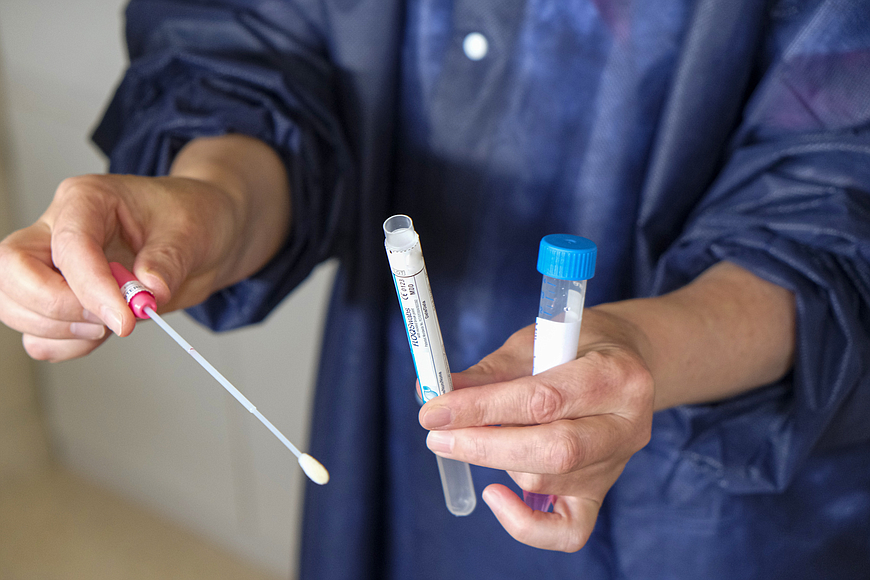- April 25, 2024
-
-
Loading

Loading

The omicron variant of COVID-19 is causing a dramatic increase in cases in Flagler County and Volusia County — but not as many hospitalizations and deaths as previous variants.
A month ago, Flagler County had 79 positive COVID-19 cases over the course of a week. This past week, it had 1,166 cases, Florida Department of Health-Flagler Health Officer Bob Snyder said on Flagler Broadcasting's "Free For All Friday" radio program Jan. 7.
"The data backs up the fact that ... omicron [is] more contagious, not as severe: There's this big gap now between cases and hospitalizations and deaths," Snyder said. "But we definitely broke a record in Flagler County, as has the state and the nation, this past week."
Volusia County has also seen significant increases, with 6,443 positive cases this week, compared to 3,939 the week before, according to Florida Department of Health-Volusia Health Manager Benjamin Juengst.
“The rate of increase has been monumental for this one,” Juengst said.
Daily case rates in Volusia have risen from 30-40 a day to over 1,000 new cases per day, he said. The health department is working on handling about 35 outbreaks in Volusia County, many of them at various care facilities, he said.
“We’ve had a very steep increase in cases since around Christmas time, and these are about, roughly, double what we were in the summertime in case numbers,” he said. “It’s more transmissible [than delta], which is shocking, because delta was very transmissible, too … which is why our cases have skyrocketed even faster than delta.”
Emergency department and hospital visits for COVID-19, however, are lower than this past summer, he said.
Although hospitals aren’t seeing as many severely ill patients as they were over the summer, they’re facing other problems.
“They’re busy because they’re also having staffing problems,” Juengst said.
Wally De Aquino, chief operating officer at AdventHealth Palm Coast, said the hospital is seeing more breakthrough cases in vaccinated patients than it did with previous variants, but that these breakthroughs aren’t making patients as sick.
Florida Department of Health-Flagler Medical Director Dr. Stephen Bickel said he believes omicron hasn’t peaked yet, but that it looks like it will in late January or early February.
“I’m pretty optimistic, starting maybe in March, that omicron’s definitely less serious; we’re going to have treatments that are widely available,” he said. “... There’s going to be almost universal immunity on some level to what's out there — including, all the people who got omicron, they're going to be immune to omicron.”
That’s going to make it harder for another variant to be successful, he said.
“I think we’re going to reach a state where it’s endemic, not pandemic,” Bickel said. “You're going to see it in the population; it’s not going to be gone, but there might be little waves like there is for flu in the winter, but not these giant waves.”
The variant is so contagious that little will stop it, he said.
“It’s almost impossible to stop the spread,” Bickel said. “… The biggest problem is still the same problem as before — unvaccinated people with comorbidities who are at high risk for bad outcomes, they’re the main concern. They’re the ones most likely to end up in the hospital.”